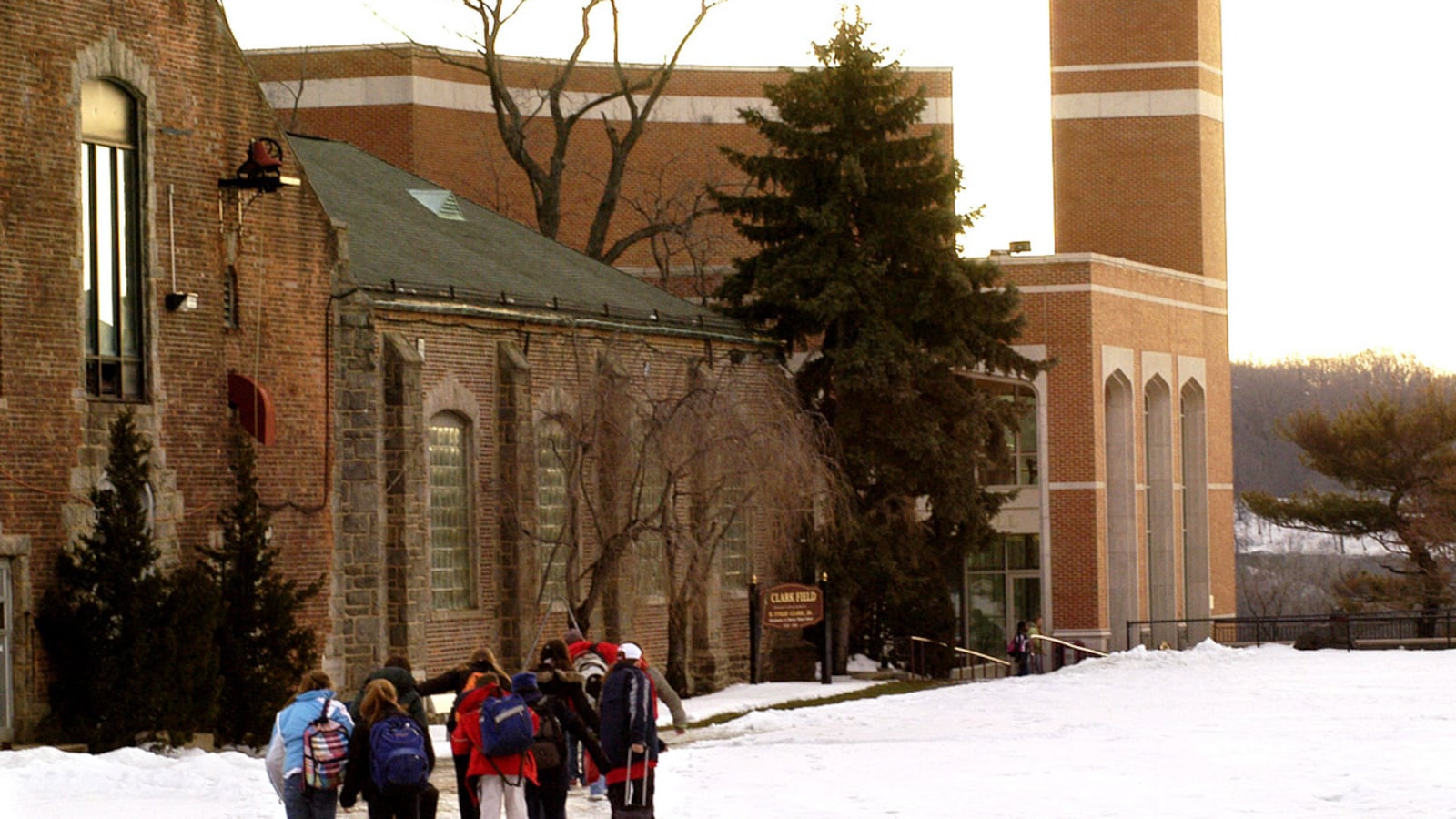Unlike other kids, I had not driven before at all before I started driver’s education. I don’t think I’d ever even turned a car key in the ignition. So the first time I got behind the wheel in driver’s ed in 1986, when I was 16 at the Horace Mann School in Riverdale, N.Y., I was incredibly nervous. It was just me, another kid from my class, and our teacher, Joseph Klein.
Because it was midday, I had gotten a bagel with cream cheese that I planned to eat after. While I was putting on my seatbelt—pretty much the only thing I knew how to do in a driver’s seat—I momentarily placed the tin foil-wrapped bagel between my knees. As the seatbelt clicked, Mr. Klein said, “I wish I were where that bagel is.” I looked at him. He was vile, with Strom Thurmond-style red hair Brylcreemed onto his head. I thought about how his reputation had preceded him. How everyone knew that he had been a math teacher but because he was such a lech, the school had demoted him to driver’s ed. I glanced at my fellow classmate in the backseat, who shot me a bug-eyed, horrified look. I laughed nervously, started the car, and proceeded to be groped by Mr. Klein for the half-hour I drove through the Bronx streets.
This incident is by no measure the most disgusting thing that’s ever happened to me. It is, however, the reason I never got back in the car with Mr. Klein again. At age 29 I had to enlist in the Grand Prix Driving School in Manhattan with another loser friend who’d never gotten his license.
But mostly, it makes me think about kids, teachers, power, schools, and sexual abuse. I told that bagel story to Amos Kamil, whose astounding investigation, “Prep-School Predators: The Horace Mann School’s Secret History of Sexual Abuse,” went online Wednesday and will be on the cover of The New York Times Magazine on Sunday. I first spoke with Amos during the week between Christmas and New Year’s—which shows you how long he worked on the piece—after being connected through my friend and fellow Horace Mann ’87 graduate, Ariel Kaminer, his editor.
Amos and I talked a lot about how it is that kids know things, and what they choose not to share with adults, even adults who might be able to help. Who, for instance, had warned me that Mr. Klein was a perv? And why didn’t I complain to an administrator about what he said to me, that he touched me repeatedly under the auspices of showing me how to steer, and that I finished the class not knowing how to drive as a result?
When prompted by Amos to ask Horace Mann friends what their memories were, I was reminded by one that a math teacher had upgraded a C- she’d gotten to a B+ because, he said, “she was cute.” Another told me she’d been given drugs by an English teacher. A third reminded me that a different male English teacher had had an affair with a female student we knew.
Twenty-six years later, it’s hard to remember why I never reported any of these things. The New York Times story meticulously, and even beautifully, chronicles how some episodes I witnessed unfolded; particularly the story of Stanley Kops, a history teacher I loved even though I knew he was totally fucked up. In the story, Amos describes what Mr. Kops called a “frolic”—we’d come into class, and he would have written “frolic” in tiny letters on the chalkboard. That meant that instead of a regular lecture or his usual Socratic quizzing, we would clear the desks and jump on top of each other in a melee for 50 minutes that he would join until he was sweating, panting, and red. We were 13; we knew it was insane. Yet many of us loved him, too. (As Amos recounts, Mr. Kops ended up going way too far with a kid who did tell, “resigned,” got another teaching job but was too strange to keep it, and later committed suicide.)
I also can’t remember what I thought of Mr. Kops as a closeted kid. I’m pretty sure I didn’t think his sexuality had anything to do with mine. When Amos told me that he was fairly sure that Mr. Kops and R. Inslee Clark Jr., the head of school whom we all knew as “Inky,” had been lovers, I was shocked—I had always thought they were just creeps and molesters, not actual gay men. Mr. Clark’s office had framed photographs of the boys from the varsity baseball team that he coached; he had a bumper sticker that said, “I [Puffy Heart] Bucky”—Bucky Dent, that is, the Yankee who’d had one heroic moment against the 1978 Red Sox, and otherwise was known for being extremely good-looking…and young looking, too. (Update: To be clear, none of the dozens of people interviewed for the Times story identified Inky as a molester.)
Since Mr. Kops left in disgrace, and after he killed himself, I’ve thought of him often. I’ve thought of Inky over time, too, and the fratty, no-girls-allowed vibe he exuded that trickled throughout the school (which is ironic, considering that he’d made the school co-ed). I thought of them both a lot after the Penn State story broke, and people wondered, how does this happen in a school, and how are these secrets kept? It wasn’t hard for me to understand why Jerry Sandusky, if the charges swirling around him are true, was able to go on as he did—and why his boss, Joe Paterno, failed to report the accusations against him.

Toward the end of the Times story, Amos writes about visiting the Horace Mann campus now. He describes the always-pretty, always-fancy campus in a way that sounds familiar to me, though I haven’t been there in many years and haven’t seen its changes. He specifically mentions the centerpiece of the school: the boys’ baseball field, Inky’s masterpiece. He calls it “that same green diamond of manicured grass that a member of the Yankees grounds crew once helped maintain.” And he mentions something I didn’t know—it’s now called Clark Field.
I was on the girls’ softball team, and we played across the street and up the hill from there. There was a ditch in right field before the fence started that, once in a while, a player would fall into. Our field, for some reason, also was filled with rocks. Before every game, we’d walk around the infield scanning the ground for stones that could cause a groundball to shoot up into someone’s face. We had no Yankees ground crew.
I loved many things about Horace Mann. But I always knew it was a boys’ club. I hope that’s changed dramatically; I also hope the culture of the school would allow students to feel comfortable and safe reporting bad things that happen to them.
Even on Clark Field.
Update: An earlier version of this story identified Joseph Klein as “Mr. Anonymous.”






